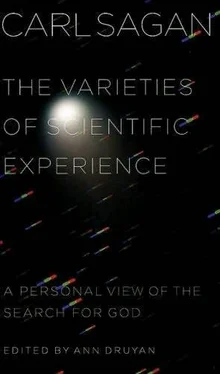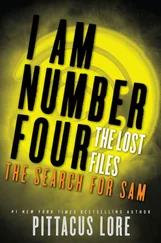Some calculations have been done at the National Center for Atmospheric Research in which a five-thousand-megaton war occurs in July. The widespread distribution of smoke twenty days after the war is over would produce temperature declines as much as fifteen to twenty-five centigrade degrees below normal.
The net result, as you might imagine, is bad. The effects are global. It appears that they last for months, possibly years. Imagine what disastrous worldwide consequences the destruction of agriculture alone would have. The northern midlatitude target zone is precisely the region that is the principal source of food exports (and experts) to the rest of the world. Even countries nowhere near malnutrition today-Japan, for example- could utterly collapse in a nuclear war from the clouds blown eastward from China, an almost certain target in a nuclear war. Even apart from that, if there were no climatic effects in Japan, and not a single nuclear weapon dropped on Japan, it turns out that more than half the food that people eat there is imported. That alone would kill enormous numbers of people in Japan, and the actual effects would be much worse.
When scientists try to estimate what the consequences of a nuclear war would be, you have to worry not just about the prompt effects. They would be bad enough. The World Health Organization calculates that in an especially nasty nuclear war the prompt effects might kill almost half the people on the planet. You also have to worry about nuclear winter, the cold and the dark that I've just been describing; you have to worry about such facts that those conditions kill not just people and agricultural plants and domesticated animals but the natural ecosystem as well. At just the point that survivors might want to go to the natural ecosystem to live off it, it would be severely stressed.
There is a kind of witches' brew of effects that have been very poorly studied by the various defense establishments, some more than others. These include, for example, pyrotoxins, the smogs of poison gas produced from the burning of modern synthetics in cities, increased ultraviolet light from the partial destruction of the protective ozone layer, and the intermediate timescale radioactive fallout, which turns out to be some ten times more than confident assurances by miscellaneous governments have had it. And so on. The net result of the simultaneous imposition of these independently severe stresses on the environment will certainly be the destruction of our global civilization, including Southern Hemisphere nations, nations far removed from the conflict-nations, if you can find any, that had no part of the quarrel between the United States and the Soviet Union-and, of course, northern midlatitude nations, it goes without saying.
Beyond that, many biologists believe that massive extinctions are likely of plants, of animals, of microorganisms, the possibility of a wholesale restructuring of the kind of life we have on Earth.
It would probably not be as severe as the Cretaceous-Tertiary catastrophe, but possibly approaching it. A number of scientists have said that under those circumstances they cannot exclude the extinction of the human species.
Now, extinction seems to me serious. Hard to think of something more serious, more worthy of our attention, more crying out to be prevented. Extinction is forever. Extinction undoes the human enterprise. Extinction makes pointless the activities of all of our ancestors back those hundreds of thousands or millions of years. Because surely if they struggled for anything, it was for the continuance of our species. And yet the paleonto-logical record is absolutely clear. Most species become extinct. There's nothing that guarantees it won't happen to us. In the ordinary course of events, it might happen to us. Just wait long enough. A million years is quite young for a species. But we are a peculiar species. We have invented the means of our own self-destruction. And it can be argued that we show only modest disinclination to use it.
This is what in a number of Christian theologies is called crimes against Creation: the massive destruction of beings on the planet, the disruption of the exquisitely balanced ecology that has tortuously grown up through the evolutionary process on this planet. So, since this is clearly recognized as such a theological crime as well as all the other kinds of crimes, it is reasonable to ask where are the religions-the established religions, the incidental independent-thinker religionists-on nuclear war?
It seems to me this is the issue above all others on which religions can be calibrated, can be judged. Because certainly the preservation of life is essential if the religion is to continue. Or anything else. And for me personally, I believe there is simply no more pressing issue. Whatever else we're interested in, it is fundamentally compromised by nuclear war. Whatever personal hopes we have for the future, ambitions for children and grandchildren, generalized expectations for future generations-they are all fundamentally threatened by the danger of nuclear war.
It seems to me that there are many respects in which religions can play a benign, useful, salutary, practical, functional role in the prevention of nuclear war. And there are still other ways that are maybe longer shots but, considering the stakes, are well worth considering. One has to do with perspective.
Now, not all religions have this perspective on the stewardship of the Earth by men and women, but they could. The idea is that this world is not here for us only. It is for all human generations to come. And not just for humans. Or even if you took only a very narrow view of the world, if you were a speciesist in the same sense as being a racist or a sexist, still you would have to be very careful about all those other nonhuman species, because in many intricate ways our lives depend on them. I remind you of the elementary fact that we breathe the waste products of plants and plants breathe the waste products of humans. A very intimate relationship if you think about it. And that relationship is responsible for every breath you take. We in fact depend on the plants, it turns out, a lot more than the plants depend on us. So that sense that this is a world that is worth taking care of is, it seems to me, something that could be at the heart of religions that wished to make a significant contribution to the human future.
Then there are more direct kinds of political activity. For example, religious people played a role in the abolition of slavery in the United States, and elsewhere. Religions played a fundamental role in the independence movement in India and in other countries and the civil rights movement in the United States. Religions and religious leaders have played very important roles in getting the human species out of situations that we should never have gotten into that profoundly compromised our ability to survive, and there is no reason religions could not in the future take on similar roles. There are, of course, occasional circumstances, individual clergypersons who have taken that role in this particular crisis, but it is hard to see any major religion that has made this kind of political activity its foremost objective.
There is also the issue of moral courage. Religions, because they are institutionalized and have many adherents, are able to provide role models, to demonstrate that acts of conscience are creditable, are respectable. They can raise awkward possibilities. The pope, for example, has raised (although not answered) the question about the moral responsibility of workers who develop and produce weapons of mass destruction.
Or is it okay as long as there is a local excuse? Are some excuses better than other excuses? What are the implications for scientists? For corporate executives? For those who invest in such companies? For military personnel? The archbishop of Amarillo has urged workers at a nuclear-weapons facility in his diocese to quit. So far as I know, no one has quit. Religions can remind us of unpopular truths. Religions can speak truth to power. It's a very important function that is often not carried out by all the other sectors of society.
Читать дальше










